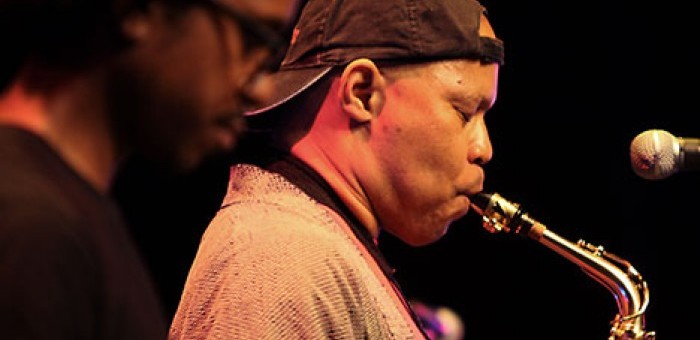Jan 13, 2026 2:09 PM
More Trump-Kennedy Center Cancellations
The fallout from the renaming of the John F. Kennedy Center for the Performing Arts to include President Donald…

Jonathan Finlayson (left) and Steve Coleman at the Atlas Performing Arts Center on Sept. 26 (Photo: Jati Lindsay)
(Photo: )Steve Coleman brought a little bit of the old and a little of the new to Washington, D.C., on Sept. 26 as his ensemble Five Elements kicked off the Atlas Performing Arts Center’s new jazz season. The influential saxophonist, composer and bandleader hadn’t performed in the District in over a decade, so the concert was an auspicious occasion that concluded with a Q&A session moderated by journalist Michael J. West.
The personnel and instrumentation for Coleman’s Five Elements have been in near-constant flux ever since he became the de facto spokesperson for M-BASE in the mid-’80s. The elaborate musical philosophy M-BASE—the acronym stands for “Macro-Basic Array of Structured Extemporizations”—is characterized by intertwining horn improvisations rooted mostly in modern bebop; hyper-intricate, multi-metered, interlocking polyrhythms; and cyclical group interplay that recalls West African drum circles.
Some recent incarnations of Five Elements have included vocalists, Afro-Cuban percussionists, trombonists, various woodwind and brass players and even dancers. At the Atlas concert, though, Coleman fronted a scaled-down version. Bassist Anthony Tidd and drummer Sean Rickman—a splendid rhythmic duo that had performed with Five Elements between the late ’90s and early aughts—was back in the lineup, joining trumpeter Jonathan Finlayson, one of the newer members.
The piano-less quartet didn’t lack firepower. The leaner Five Elements sounded meaner, too, exhibiting an elasticity that was unruffled by peculiarities such as the pipa and spoken-word artists of recent past. Coleman began the proceedings with an extended solo improvisation filled with fluid, zigzagging passages. His tone has softened lately, revealing an unexpected comeliness that wasn’t so apparent a decade ago. Soon, Finlayson entered with an elaborate fugue-like counterpart that showcased his burnished tone. This gave way to Tidd thumping the ominous bass ostinato for “Wheel Of Nature,” an entrancing classic from Coleman’s 1997 double-disc set, Genesis & The Opening Of The Way. Rickman underscored Tidd with a serrated, intricate pattern that evolved with increasing complexity as he accentuated the pulse with unexpected tom-tom fills and quick double-pedal bass-drum accents.
From there, Five Elements ventured deep into a heady, almost nonstop suite. The music became an elaborate jigsaw puzzle, the pieces made of compositions from Coleman’s expansive repertoire. Familiarity came through the feel of the songs more than any discernable melodies. The ensemble made complete stops with sniper-like precision a few times, but Coleman didn’t bother to announce any of the pieces’ titles.
The music’s intrepidness didn’t hinder the listening pleasure, though. Coleman dazzled as an improvising daredevil, prone to building statements out of recurring motifs one moment and then unleashing prolix essays the next. Finlayson was an ideal frontline partner. Like Coleman, the trumpeter can uncoil knotty figures with supple grace. He also showed his knack for blowing hushed textures underneath Coleman’s corkscrew passages.
As for Rickman and Tidd, it’s a toss-up as to which one deserved the MVP award. Rickman’s dexterity, sense of time and ingenuity at steering the momentum while constantly shifting and shaping the rhythmic framework were stupendous. He functioned almost like a pianist in the group.
But it was Tidd’s sometimes deceptively simple bass lines that held all the hyperactivity together. He also underscored much of the diverse cultural evocation in Coleman’s music, with bass accompaniments alluding to Cuba, Senegal, Morocco and New Orleans.
Toward the end of the set, Coleman and Five Elements covered a wealth of musical terrain with material that sounded simultaneously familiar and foreign but certainly not forgettable.
—John Murph

Belá Fleck during an interview with Fredrika Whitfield on CNN.
Jan 13, 2026 2:09 PM
The fallout from the renaming of the John F. Kennedy Center for the Performing Arts to include President Donald…

Peplowski first came to prominence in legacy swing bands, including the final iteration of the Benny Goodman Orchestra, before beginning a solo career in the late 1980s.
Feb 3, 2026 12:10 AM
Ken Peplowski, a clarinetist and tenor saxophonist who straddled the worlds of traditional and modern jazz, died Feb. 2…

The success of Oregon’s first album, 1971’s Music Of Another Present Era, allowed Towner to establish a solo career.
Jan 19, 2026 5:02 PM
Ralph Towner, a guitarist and composer who blended multiple genres, including jazz — and throughout them all remained…

Rico’s Anti-Microbial Instrument Swab
Jan 19, 2026 2:48 PM
With this year’s NAMM Show right around the corner, we can look forward to plenty of new and innovative instruments…

Richie Beirach was particularly renowned for his approach to chromatic harmony, which he used to improvise reharmonizations of originals and standards.
Jan 27, 2026 11:19 AM
Richie Beirach, a pianist and composer who channeled a knowledge of modern classical music into his jazz practice,…